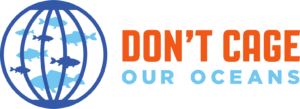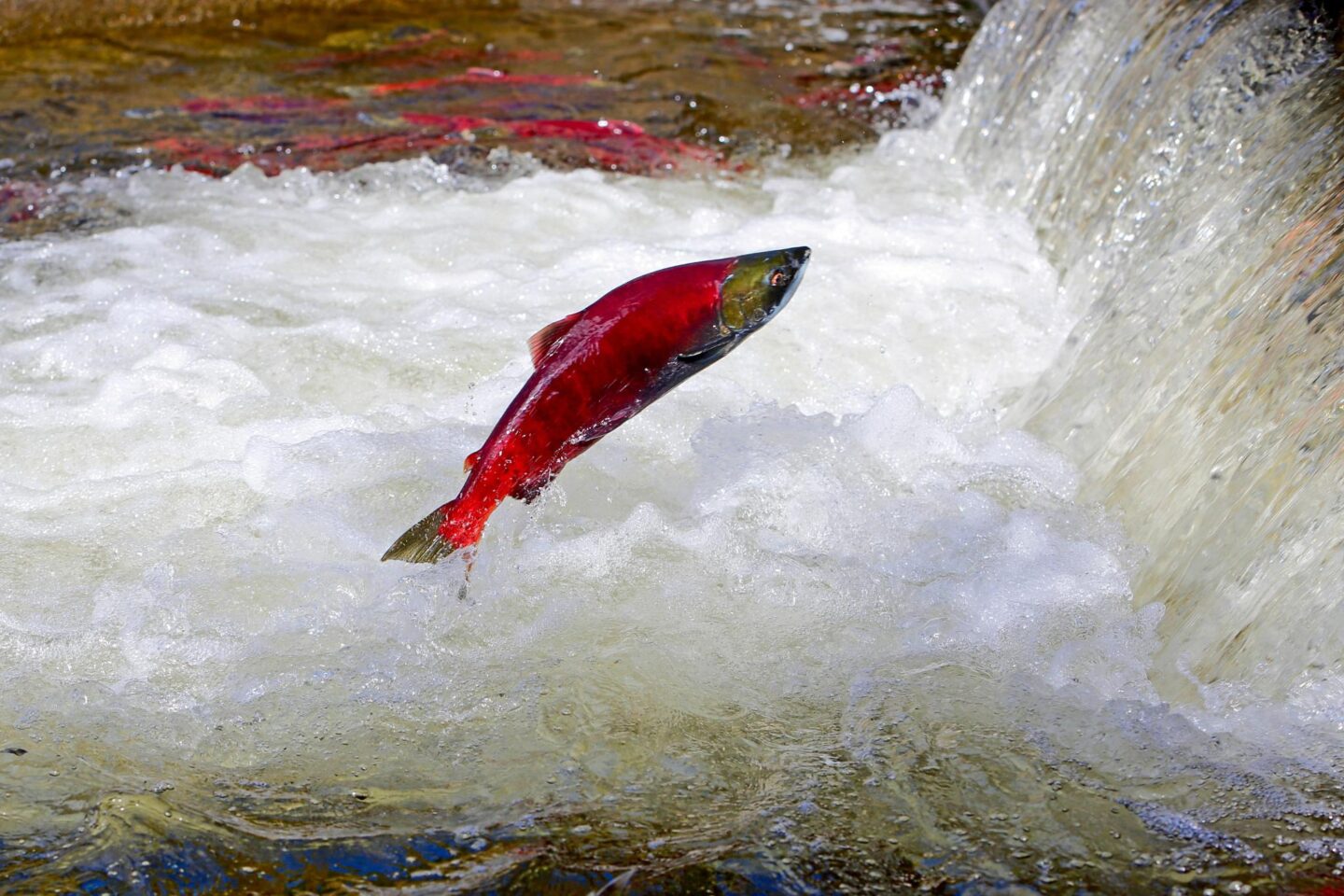For Immediate Release: April 30, 2025
Contact:
Feini Yin, feini@namanet.org, 908-745-9768 (text/call)
Hamida Kinge, hamida@namanet.org, 215-990-9678 (text/call)
Download a PDF of this press release.
Access the press brief here and the full press kit here.
Washington, D.C. — On April 30, 2025, Senators Cory Booker (D-NJ) and Dan Sullivan (R-AK) jointly introduced the bipartisan Keep Finfish Free Act of 2025. The bill, inspired by the late Representative Don Young’s 2021 legislation of the same name, bars federal agencies, including the National Oceanic and Atmospheric Administration and the U.S. Army Corps of Engineers, from issuing commercial permits to industrial fish farms in federal waters without approval from Congress. U.S. federal waters extend from about 3 to 200 miles from the coastline for 48 states (starting at about 9 miles in the Gulf coast of Texas and Florida). This area, called the exclusive economic zone, falls under federal regulation for fishing and maritime activities.
“Industrial finfish aquaculture operations are like underwater factory farms, polluting our oceans and spreading potentially deadly diseases and parasites to wild fish,” said Senator Booker. “These operations use millions of pounds of wild fish to feed the caged fish at an unsustainable rate of consumption that depletes marine resources in traditional fishing areas. As we make decisions that will impact the future of our oceans, we should not go down the unsustainable road of allowing commercial finfish aquaculture in our federal waters. Instead we should chart a different path built around the health of wild fish stocks and ocean ecosystems.”
“Alaskans are deeply invested in protecting the health of our marine ecosystem, and maintaining sustainability of our world-class fisheries,” said Senator Sullivan. “That is why I’m introducing legislation with Senator Booker to ban risky fish farming operations in federal waters that could jeopardize the health of our fish species and undermine Alaska’s coastal fishing communities. I hope my colleagues will join us in passing this important legislation to keep American finfish healthy and free!”
The Keep Finfish Free Act has received support from commercial fishermen, fishing associations, farming associations, chefs, food system advocates, conservation groups, small businesses, and seafood consumers that want to see working waterfronts and seafood economies flourish in domestic shoreside communities.
“What affects fishers affects farmers, too; we co-exist within the same food systems. Factory farming on land has displaced small producers, harmed rural communities, and depleted natural resources,” said Cali Alexander, board member and policy chair with the Northeast Organic Farming Association of NJ (NOFA-NJ), and former state seafood administrator with the NJ Department of Health. “Now, industrial-scale fish farming threatens to do the same. So we at NOFA-NJ are grateful to Senator Booker for co-sponsoring the Keep Finfish Free Act, a vital push toward keeping food production truly sustainable and in the hands of those who put food on our plates.”
“Reintroduction of the Keep Finfish Free Act is a welcome display of support that Senator Sullivan and Senator Booker have for the fisher people who provide natural and healthy food to the world,” said Melanie Brown, Native Alaskan fisherwoman and outreach director at SalmonState. “Thank you, senators, for leading the charge on keeping net pens out of the waters of our wild-caught fisheries.”
Already outlawed in Alaska and Washington state waters, and heavily restricted in California, commercial finfish farming in the ocean comes with a laundry list of negative impacts for marine life, fisheries, and seafood consumers. The mass production of farmed fish, including salmon, yellowtail, and striped bass, floods markets and competes with wild heritage fisheries in the U.S. When these fish reach consumers’ plates, they become a danger to public health.
The reintroduction of KFFA comes on the heels of a recent federal court decision, delivering a one-two punch against commercial finfish farming in U.S. waters. Specifically, the court decision struck down a nationwide permit that would have allowed industrial finfish aquaculture structures in federal waters without site reviews.
Mass-scale fish farming involves raising high volumes of captive fish in crowded net pens, pods, and cages in open waters. They have been called the underwater equivalent of land-based concentrated animal feeding operations, or factory-style CAFO farms. The captive fish are persistently exposed to viruses, bacteria, and fungi, and operators flood the enclosures with pharmaceuticals to combat these pathogens. A contaminated slurry ensues, which impacts surrounding fish, marine mammals, and migratory seabirds.
Recent research has also shown that fish waste from densely packed populations, excess feed, and overuse of pharmaceuticals can lead to mass mortality events and oxygen-starved “dead zones” around aquaculture production facilities.
In the U.S. and abroad, frequent mass escapes from finfish farms pose a danger to wild fish populations by introducing diseases and altering the genetics of wild fish, while intensifying competition for food, habitat, and breeding areas. In 2024, 65,000 Atlantic salmon smolts escaped a facility in Norway. In 2023, 50,000 farmed juvenile salmon escaped a facility in Maine. Countless other examples exist, but one of the largest came in 2017 when more than 260,000 non-native Atlantic salmon escaped from Cooke Aquaculture’s failed net-pen farm in Puget Sound.
Multiple other issues plague these operations. For instance, most finfish species farmed in open waters are carnivorous and require a diet rich in animal protein. Their feed often consists of wild-capture fish and fish byproducts, a practice that has decimated some fisheries and contributed to global food insecurity. A recent study found that popular aquaculture species like salmon, trout, and eel likely require more than two pounds of wild fish to produce one pound of farmed biomass. Underwater pens also pose entanglement risks to marine mammals, which are drawn to the concentrated fish as a potential food source.
Moreover, industrial finfish farming can be a death knell for domestic wild-capture fisheries and shoreside communities. They compete with community-run fishing operations in an industry already struggling to stay afloat. This could, in turn, lead to economic devastation and displacement for U.S. coastal families and businesses. The seafood-consuming public is not spared either. When they eat these products, they are exposed to pathogens, persistent organic pollutants, and other contaminants.
Additional statements of support for KFFA:
“Thank you, Senator Booker, for introducing the Keep Finfish Free Act. The last thing our ocean needs is industrialization, especially off New Jersey and New York coasts. Offshore finfish farms would harm and contaminate our wild and free ocean with pollution including from pharmaceuticals, chemical feed, and concentrated fecal matter. It will also promote diseases and genetic mutations which will threaten native species. In short, nothing but yuck. We need strong laws to ensure our ocean is clean and healthy for all to enjoy today and for future generations,” said Cindy Zipf, executive director of Clean Ocean Action, based in Long Branch, NJ.
“I’m thrilled to see Alaska’s Senator Sullivan carry forward the legacy of the late Rep. Don Young. Wild salmon have always been integral to Alaskan coastal heritage and economies, and this bill seeks to keep it that way. I’m also pleased to see the support of Senator Booker of New Jersey, who has long been a champion for small family farmers and family fishing communities. With this bill, we can nip rogue agency action in the bud and protect wild fish and the communities that depend on clean oceans and healthy seafood,” said James Mitchell, legislative director of the Don’t Cage Our Oceans coalition.
“We can feed our own nation with natural [seafood] resources, but unfortunately it’s all exported, and we import the same amount — around 70–90% — and that’s what I believe people need to realize. So there’s no need to grow fish to feed ourselves because we have enough of it here with what the ocean already provides. New England, for example, has been feeding people from the sea for generations, and we still have the wild fish to keep doing it. The Keep Finfish Free Act will help keep the seafood supply in our hands, not at the mercy of global supply chain breakdowns,” said Doug Feeney, an independent Massachusetts fisherman, advocate for dogfish fisheries, and co-founder of the Chatham Harvesters Cooperative.
“Industrial-scale fish farming pushes a monoculture model that ignores that the oceans are interdependent ecosystems that thrive on biodiversity, not enclosed factories pumping out single species of fish. Fishing communities understand the complex ocean ecosystems and ensure their catches respect the diversity below the waves. In turn, the ocean gives back an abundant and diverse seafood supply. The Keep Finfish Free Act supports this natural give and take, and the communities that benefit from it,” said Niaz Dorry, coordinating director of North American Marine Alliance and executive director of the National Family Farm Coalition.
“As a Southern chef who cares about good food, clean water, and the people who make it all possible, I support the Keep Finfish Free Act to protect our oceans and small family fisherfolk. Industrial finfish farming puts wild fish, the quality of our waters, and our cultural seafood traditions at risk. We’ve been enjoying wild-caught fish from these waters for generations, and I want to ensure we can keep doing that for many years,” said Cassandra Loftlin, chef, sustainable food systems advocate, and owner of Goodness Gracious Grocery, based in Augusta, GA.
“As a New Orleans chef, the most meaningful relationships I’ve built over the past 20 years are with our local fishers and shrimpers. Their future is under threat from all sides: coastal erosion, a growing dead zone, rock-bottom prices at the docks caused by toxic imports — and now, potential industrial fish farms in their waters. Enough is enough. It’s about survival. Finfish farms bring pollution, crowd out traditional fishing grounds, and even limit access to port facilities. There’s no ‘net benefit’ here. That’s why I support the Keep Finfish Free Act,” said Dana Honn, chef, co-owner of Nikkei Izakaya and other restaurants, and founder of the Louisiana Shrimp Festival and Shrimp Aid.
# # #
About Don’t Cage Our Oceans
Don’t Cage Our Oceans is a coalition of organizations and businesses fighting industrial aquaculture, while uplifting values-based aquaculture and seafood systems. DCO2 is a program of the North American Marine Alliance. Learn more at dontcageouroceans.org.
Photo credit: rima15 / Adobe Stock

